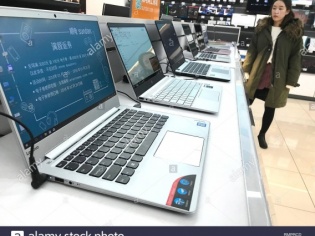-
Team TechTree
07:46 10th Dec, 2019
Did China Just Ban Products of Global Tech Giants? | TechTree.com
Did China Just Ban Products of Global Tech Giants?
Media reports suggest that Beijing is all set to replace hardware and software from all its government offices over a three-year timeframe

Looks like President Trump has got the Chinese dragon breathing fire again. Close on the heels of the United States FCC reducing spends on Chinese hardware (specifically Huawei and ZTE), there are now reports that Beijing wants all PCs and operating systems running in the official establishment across the country within the next three years.
A report published in the Financial Times quotes tech analysts in China to suggest that the latest move isn’t merely aimed at replacing software from the United States and Europe but to replace these with Chinese equivalents and also junk the millions of hardware pieces on which these are currently run.
This is the second such move since China brought in the Internet Security Law of 2017 which has been criticized for being ambiguous with experts then suggesting that global brands may have separate their local IT systems from their global networks. The law lays emphasis on using technology in China that is both “secure” and “controllable”
While the Western media has criticized Beijing of launching a police state through its home-made surveillance mechanisms to quell political unrest of the kinds that were witnessed in Xinjiang in 2009, the fact remains that Chinese industry has been preparing for such an eventuality for some time now.
China has had strained relationships with companies such as Microsoft in the past and Google more recently where they forced the search engine to shift base from the mainland to Hong Kong following the country launching its own equivalent called Baidu.
Though the details of China’s latest move are sketchy at the very best, the Financial Times report says the idea is to replace 30% of the PCs and software by end of 2020, followed by 50% the next year and the remaining 20% in year three. The most obvious question that comes to mind is, can Chinese hardware industry manage to fulfil such big orders?
Also, what about the components that go into these PCs and laptops? Would it mean that AMD and Intel processors are out as would be Nvidia GPUs and Sony image processors? Are the equivalent components in the same league as the ones they are supposed to replace? Given the iron curtain behind which China’s IT industry operates, one can never be sure.
The problem gets more acute when it comes to the software. Though Chinese enterprises have been preparing the ground for several years given their inkling to move away from depending on American companies, the fact remains that the country still doesn’t have same-to-same matches for say Android operating systems for smartphones or Windows for their PCs.
A larger question before the US tech companies would relate to how this move would impact their top line growth over the next two to three years and thereafter. A recent Bloomberg report claimed that the Chinese were hoarding US-made computer chips with data suggesting such a growth over the past three years – to be precise from just before China’s internet security law came into force.
With the Sino-US trade war showing no signs of abating any time soon, it remains to be seen whether the current showdown would have any impact on Sino-Indian trade. With both Huawei and ZTE planning capital investments in the country, there could be a far-fetched scenario whereby the Chinese government may get some of its requirements from this part of the world.
Of course, there is a fly in the ointment whose name is Ajit Pai and who happens to be the person piloting the US plans to reduce funding for purchase of Chinese hardware. As the Chairman of Federal Communications Commission (FCC), Pai went on record to suggest that Washington’s decision was based on the fact that both Huawei and ZTE connections to the Chinese government and military.
So, one just has to hope that the Indian connection here is lost on the Chinese when they sit down to plan on how they propose to produce hardware in such massive numbers so as to replace all the functioning PCs, Laptops, Routers, Printers and every other piece of equipment that finds use in their government offices.
TAGS: China, Software, Hardware, Ban, Huawei, ZTE, Intel, AMD
- DRIFE Begins Operations in Namma Bengaluru
- Sevenaire launches ‘NEPTUNE’ – 24W Portable Speaker with RGB LED Lights
- Inbase launches ‘Urban Q1 Pro’ TWS Earbuds with Smart Touch control in India
- Airtel announces Rs 6000 cashback on purchase of smartphones from leading brands
- 78% of Indians are saving to spend during the festive season and 72% will splurge on gadgets & electronics
- 5 Tips For Buying A TV This Festive Season
- Facebook launches its largest creator education program in India
- 5 educational tech toys for young and aspiring engineers
- Mid-range smartphones emerge as customer favourites this festive season, reveals Amazon survey
- COLORFUL Launches Onebot M24A1 AIO PC for Professionals







TECHTREE